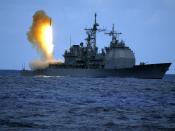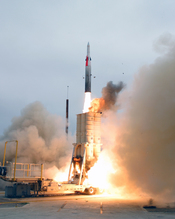President Bush has decided to get rid of the Anti-Ballistic Missile Treaty and replace it with a large-scale missile defense system. But there are a few obstacles standing in the way of creating such a system. These obstacles consist of approval from European allies, Russia, and Congress. Also, finding the funds to pay for this system and creating a missile system that actually works are what Bush and his aids are working on. The administration is hoping for a missile system that will be deployed in three years.
On Tuesday at the National Defense University Bush gave a speech where he mentioned an array of various defensive systems, including weapons that are land, sea, and air based. Reactions from foreign countries to the speech varied. China condemned the idea, Russia and Germany advised caution, while Australia gave support. U.S. allies felt concern with the removal of the AMB Treaty and feel as if it has worked well.
German Foreign Minister Joschka Fischer also feels the same as other allies. She concerned with the start of a new arms race and says if a new system is developed, it must be better than the previous. "Russia, as well as Germany is insistent on keeping and strengthening ABM,"ÃÂ says Igor Ivanov, Russia's Foreign Minister. China believes the missile defense plan has violated the ABM, and will destroy the balance of international security.
Democrats of Congress express concern as well as other nations. They question if this defense system is the best possible use of defense dollars. This project would require asking for a $20-billion dollar increase in the $310-billion military budget for 2002. The new missile defense plan will require a huge increase in the defense budget, around $4.5 billion a year. This budget increase will allow the development of better ship-based missile systems as well as research on space weapons and anti-missile lasers on aircraft. There has been little opposition to this plan in Congress. The opponents don't want to obstruct the building of a technology that will protect the nation's security. But only time will tell, as the plan becomes real and the budget increases.
In creating such a plan, President Bush has ignored international concerns of what other nations think. They have already expressed their views on the plan, and even though the majority seems to be in defense of the ABM Treaty, Bush continues to be involved with the new defense plan. I don't think that by creating such a plan, it would be a direct threat to the opposing nations, only a statement that the U.S. is moving forward in technology. And just as some world leaders have already said, this may create another arms race. But I think that would only happen if something is not worked out with opposing nations to where an agreement can be made and the plan can continue.





